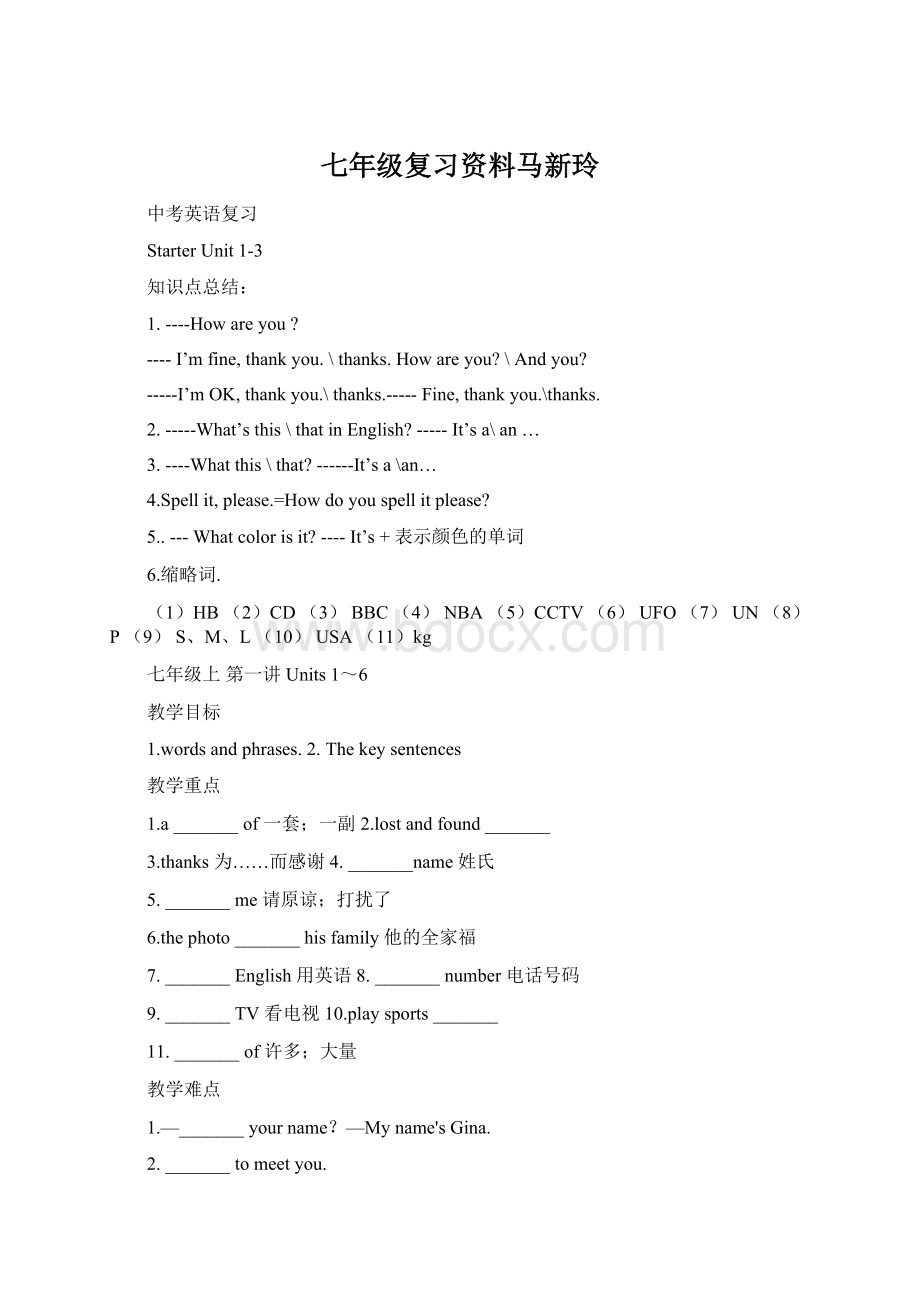七年级复习资料马新玲Word文档格式.docx
《七年级复习资料马新玲Word文档格式.docx》由会员分享,可在线阅读,更多相关《七年级复习资料马新玲Word文档格式.docx(15页珍藏版)》请在冰豆网上搜索。

5.—_______mybackpack?
—It'
s_______.
6._______youhaveasoccerball?
7.She_______bananas.She_______icecream.
教师活动
1.Look!
注意!
(Unit1)
lookv.“留神;
注意”。
如:
Lookwhereyouaregoing!
当心走路!
与之意思相近的短语有lookout,意为“当心;
小心”。
Lookout!
There'
sdangerahead!
小心!
....
【辨析】look,see,watch与read.
2.Pleasetakethesethingstoyoursister.(Unit4)
takesth.to...“把某物带到……去”如:
You'
dbettertakeyourcoattoyourbedroom.
【拓展】与take连用的常用短语还有:
takeout取出;
借takecareof照顾takeplace发生takesomemedicine吃药takephotos拍照takeiteasy别紧张
3.Ineedmyhat...我需要我的帽子……(Unit4)
need是实义动词,“需要”,固定搭配有:
needsth.“需要某物”;
needtodosth.“需要去做某事”;
needdoing“需要被做”。
Herbikeneedsrepairing.
【拓展】need还可作情态动词,此时没有人称和数的变化,多用于否定句和疑问句中。
否定句中用needn'
t;
疑问句中直接将need提前即可。
对其肯定回答用must;
否定回答用needn'
t。
NeedIdotheworkatonce?
—Yes,youmust.是的,你必须(马上做)。
—No,youneedn'
t.——不,不需要。
4.Let'
splaysoccer.让我们踢足球吧。
(Unit5)
这是表示邀请、提议的祈使句。
let'
s是letus的缩写,表示“让我们……”,
【拓展】let常用于letsb.dosth.结构中,表示“让某人做某事”。
Mymotherletsmegototheparkonceaweek.
5.Thatsoundsgood.听起来很好。
sound是系动词,后接形容词意为“听起来”。
Hersongssoundbeautiful
【拓展】很多感官动词都可以作系动词,如look(看上去),feel(觉得),smell(闻起来),taste(尝起来)。
后跟形容词,构成系表结构。
Thedishtastesdelicious.这道菜尝起来味道好极了。
6.YangFanlikessoccer.Ialsolike...
杨帆喜欢足球。
我也喜欢……(Reviewofunits1~6)
alsoadv.意为“也;
亦;
并且”。
Mysisterhasalsogonetotown.我妹妹也进城了。
【辨析】also,too,either与aswell①also一般用于肯定句或疑问句中实义动词前,系动词、助动词或情态动词后。
②too肯定句句末,也用于疑问句,一般用逗号与前面的句子隔开。
③either用于否定句句末。
④aswell与too在句中的位置相同,但aswell前不加逗号。
Heenjoyedthetrip.Ienjoyedit,too.(=Ienjoyeditaswell.)
他喜欢这次旅行,我也喜欢。
Hedidn'
tenjoythetrip.Ididn'
tenjoyit,either.
他不喜欢这次旅行,我也不喜欢。
Practise:
Homework:
七年级上第二讲Units7~12,
1).wordsandphrases.2).Thekeysentences
1,color→adj.五颜六色的colorful→v.把……染成(某种颜色)color
2.help→n.帮助help→adj.有帮助的helpful
3.birthday→n.出生;
诞生birth
4.sell→n.出售;
廉价销售sale→(反义词)v.买buy
5.happy→adv.高兴地happily→n.高兴happiness→(反义词)adj.不高兴的unhappy
6.music→n.音乐家musician7.really→adj.真实的real
8.successful→n.成功success→adv.成功地successfully→v.成功succeed
9.usually→adj.平常的;
普通的usual→adj.非同寻常的unusual→adv.非同寻常地unusually
10.description→v.描述;
记述describe
11.busy→n.商业;
生意businessonbusiness
教学重点,
1.ataverygoodprice以非常优惠的价格
2.havealook看一看;
看一眼3.onsale廉价销售;
出售4.Englishspeechcontest英语演讲比赛
5.gotoamovie去看电影6.BeijingOpera京剧
7.onweekends在周末8.playthepiano弹钢琴
9.help...with...帮助……做……10.alittle少许;
少量
11.takeashower淋浴;
洗澡12.e�mailaddress电子邮件地址13.knowabout了解14.getto到达
15.bestrictwith对(某人)要求严格16.afterclass课后
教学难点,
1.—Howmucharethesesocks?
—They'
retwodollars.
2.—Whenisyourbirthday?
—MybirthdayisOctober10th.
3.Doyouwanttogotoamovie?
4.Canyouplaytheguitar?
5.Whattimedoyouusuallygetup?
6.What'
syourfavoritesubject?
教学流程,
1.How_mucharethesepants?
这些裤子多少钱?
(Unit7)
howmuch意为“多少”,可以询问价格,也可以提问不可数名词。
询问价格时根据后面的名词或数量决定谓语动词的单复数。
Howmucharethetomatoes?
Howmuchcoffeeisthereinthecup?
杯子里有多少咖啡?
【拓展】提问价格常用句式Howmuchis/are...?
可替换为Howmuchdoes/do...cost?
或What'
sthepriceof...?
这支钢笔多少钱?
Howmuchisthepen?
Howmuchdoesthepencost?
What'
sthepriceofthepen?
2.Anybodycanaffordourprices!
...承受得起我们的价格。
affordv.意为“买得起;
负担得起”,通常与can,could,beableto连用,尤其用于否定句或疑问句中。
CanyouaffordaMercedes�Benz?
你能买得起一辆奔驰车吗?
afford后接不定式作宾语。
Thepianoistoodear.Ican'
taffordtobuyit.
3.Shethinkstheyareveryexciting.她认为它们令人兴奋。
(Unit9)
think后是一宾语从句,表达自己对某事的观点。
变否定时,要否定前边的主句。
Idon'
tthinkitisagoodbook.我认为那不是一本好书。
It’sanexcitingresult.这是一个令人振奋的结果。
(作定语)
Theresultisexciting.这个结果令人振奋。
(作表语)
Iwasexcitedabouttheresult.我对那个结果感到兴奋。
【拓展】类似的形容词还有:
interesting(有趣的),interested(感兴趣的);
surprising(令人惊奇的),surprised(感到惊奇的);
disappointing(令人失望的),disappointed(感到失望的)等。
4.Canyouplaythepiano?
你会弹钢琴吗?
(Unit10)
playthepiano意为“弹钢琴”,play“弹奏;
演奏”。
乐器名词前面要加定冠词the,但在中国乐器Pipa,Erhu等前不加the。
【拓展】play还有“玩;
打(球)”之意。
play与球类,游戏类名词连用时,不加任何冠词。
playsoccer踢足球
5.Canyouplaythepiano,thetrumpet,thedrums,ortheguitar?
你会弹钢琴,吹喇叭,打鼓,或者弹吉他吗?
【辨析】and,but与or【拓展】or可表示假设,意为“否则”,可与if...not句式互换。
Getupearly,oryou'
llbelateforclass.
=Ifyoudon'
tgetupearly,you'
早点起床,否则上课会迟到的。
6.—Canyoudraw?
——你会画画吗?
—Yes,alittle.——是的,会一点。
alittle意为“少许;
少量;
一点儿”,修饰动词draw,表肯定。
【辨析】alittle,little,afew与few
salittlewaterinthebottle.瓶子里有点儿水。
slittletimeleft.几乎没有剩余的时间了。
Ihaveafewfriends.我有几个朋友。
He'
snewhere.Hehasfewfriends.
他是新来的,几乎没有朋友。
7.Pleasewriteandtellmeaboutyourmorning.
请写信告诉我关于你在早晨做的事情。
(Unit11)
tellv.“告诉;
讲述”。
Shewrotetotellmeshecouldn'
tcome.她写信告诉我她不能来了。
【辨析】speak,say,tell与talk
①speakvi.讲话,发言,指说话的能力。
speaktosb.与某人讲话vt.讲……(语言)speakJapanese讲日语
②sayvt.说(强调说话的内容);
(某处)写有
③tellvt.告诉、讲述,强调讲给别人听。
tellsb.sth.告诉某人某事;
tellastory讲故事;
tellalie撒谎;
tellthetruth说实话tellsb.aboutsth.告诉某人有关某事
tellsb.(not)todosth.告诉某人(不)去做某事
④talkvi.谈话,谈论,交谈,强调与人交谈。
talkto/withsb.与……交谈talkaboutsth.谈论某事
七年级下第三讲Units1~6
1.dislike→(反义词)v.喜欢like
2.across→v.穿过cross→n.交叉点;
十字路口crossing
3.center→adj.中心的central
4.turn→n.轮流turn→n.转弯处turning
5.open→v.开;
开业open→(反义词)adj.关着的closed
6.quiet→(反义词)adj.吵闹的noisy
7.beginning→v.开始begin→(同义词)v.开始;
出发start
8.hungry→(反义词)adj.饱的;
过量的full→n.饥饿hunger
9.cute→(同义词)adj.聪明的;
漂亮的smart→(同义词)adj.聪明的;
机灵的clever
10.ugly→(反义词)adj.漂亮的pretty/beautiful
11.sleep→adj.睡着的asleep→adj.想睡的sleepy
12.relax→adj.放松的relaxed→adj.令人放松的relaxing
13.dangerous→n.危险danger→(反义词)adj.安全的safe
14.sunny→n.太阳sun
15.west→adj.西方的western
16.terrible→adv.可怕地terribly
17.hot→(反义词)adj.寒冷的cold→n.热heat
18.lie→(现在分词)lying
19.humid→(近义词)adj.湿的wet→(反义词)adj.干的;
干旱的dry
20.surprised→v.使……惊奇surprise→n.惊奇surprise→adj.令人惊奇的surprising
教学重点
1.befrom=comefrom来自……2.acrossfrom在……对面
3.nextto紧挨着4.between...and...在……和……之间
5.infrontof在……前面6.turnleft向左拐
7.ontheright在右边8.havefun玩得高兴
9.thewayto去……的路10.haveagoodtrip旅途愉快
11.kindof有几分12.atnight在夜里13.takeawalk散步
14.workhard努力工作15.workas做……(工作)
16.waitfor等候;
等待17.onvacation在度假
18.takeaphoto拍照19.haveagoodtime玩得高兴
20.lookfor寻找21.talkabout谈论
22.inorderto为了
教学难点1.—Whereisyourpenpalfrom?
—She'
sfromJapan.
2.—Wheredoeshelive—HelivesinTokyo.
3.—Where’sthepark?
—It'
sonCenterStreet.
4.—Whydoyoulikepandas?
—Becausethey'
reverycute.
5.—Whatdoesshedo?
—She’sadoctor.
6.Whatdoesshewanttobe?
7.—Whatareyoudoing?
—I'
mwatchingTV.
8.—How’stheweatherinBeijing?
ssunny.
9.How'
sitgoing?
教学流程
1.Thepayphoneisbetweenthepostofficeandthelibrary.
投币电话在邮局和图书馆之间。
(Unit2)
between...and...是介词短语,意为“在……和……之间”,后接名词或代词宾格。
between意为“在……之间”,表示双方(两者)之间的关系。
among也有“在……之间”之意,是在三者或三者以上的事物之间。
(a)Thevillageliesbetweentwomountains.这个村庄位于两座山之间。
(b)Thevillageliesamongmountains.这个村庄位于群山之中。
2.Excuseme.Isthereahotelintheneighborhood?
请问,附近有旅馆吗?
—Yes,thereis.Justgostraightandturnleft.是的,向前直走,然后左转弯。
3.TurnleftonFirstAvenueandenjoythecity’squietstreetsandsmallparks.
从第一大街向左拐,享受一下本市幽静的街道和小公园的美丽。
(Unit2)
(1)turnleft意为“向左拐”,turnright(向右拐)。
Turnleftandyoucanseethepostofficeinfrontofyou.
向左拐,你就会看见邮局在你的前面。
(2)enjoyv.意为“喜欢;
欣赏;
享受……的乐趣”,后面既可以跟名词,也可以跟动词的�ing形式。
Sheenjoysthesunshineonthebeach.
ZhaoHuaenjoyslisteningtopopmusic.
赵华喜欢听流行音乐。
此外,enjoyoneself是固定短语,意为“玩得高兴”,相当于haveagoodtime或havefun。
WeenjoyedourselvesintheparklastSunday.
4.TakeawalkthroughtheparkonCenterAvenue.
步行穿过中心大街的公园。
throughprep.意为“穿过;
通过”,常与pass,go,walk,run等动词连用。
Theriverrunsthroughtheforest.那条河穿过森林。
【辨析】across,through与over5.Becausethey'
rekind_ofinteresting.
因为它们有几分趣味。
(Unit3)
kindof和alittle意思相近,意为“有点儿;
稍微”,多用于口语,用来修饰形容词。
Sheiskindofshy.她有点害羞。
【拓展】①kind可作形容词,意为“和蔼的;
善良的”。
Mrs.Brownisanoldkindlady.
②kind可作名词,意为“种类;
类型”,常用的短语有:
akindof一种;
一类。
akindofmooncake一种月饼
differentkindsof不同种类的。
Therearemanydifferentkindsofanimalsonthisisland.
这个岛上有许多不同种类的动物。
allkindsof各种各样的。
Thereareallkindsofvegetablesinthestore.
6.IwearawhiteuniformandIhelpdoctors.
我穿着白色制服,协助医生工作。
(Unit4)
wear意为“穿着;
戴着”,强调穿的状态。
SometimesIworkinthedayandsometimesatnight.
有时我白天工作,有时晚上工作。
【辨析】sometimes,sometimes,sometime与sometime
①sometimesadv.意为“有时”,经常和一般现在时连用。
Sometimesshegoesforawalkaftersupper.有时她晚饭后出去散步。
②sometimes是名词短语,意为“几次;
数次”,可以和现在完成时连用。
IhavebeentoQingdaosometimes.我去过青岛好几次了。
③sometimeadv.意为“某时;
某个时候”,既可以表过去,也可以表将来。
—Whenwillyoustart?
——你何时动身?
—Sometimenextmonth.——下个月的某个时候。
④sometime是名词短语,意为“一段时间”。
I’llbeawayforsometime.我要离开一段时间。
8.—How'
s_the_weatherinBeijing?
——北京的天气怎么样?
ssunny.——晴天。
(Unit6)①询问天气的常用句型有:
stheweatherlike+地点状语?
或How'
stheweather+地点状语?
How'
stheweatherinLondon?
=What'
stheweatherlikeinLondon